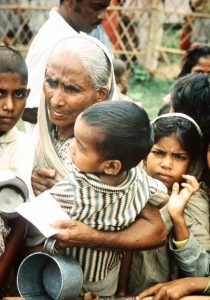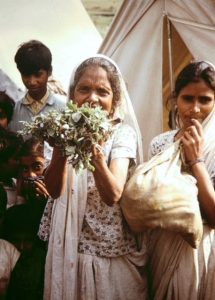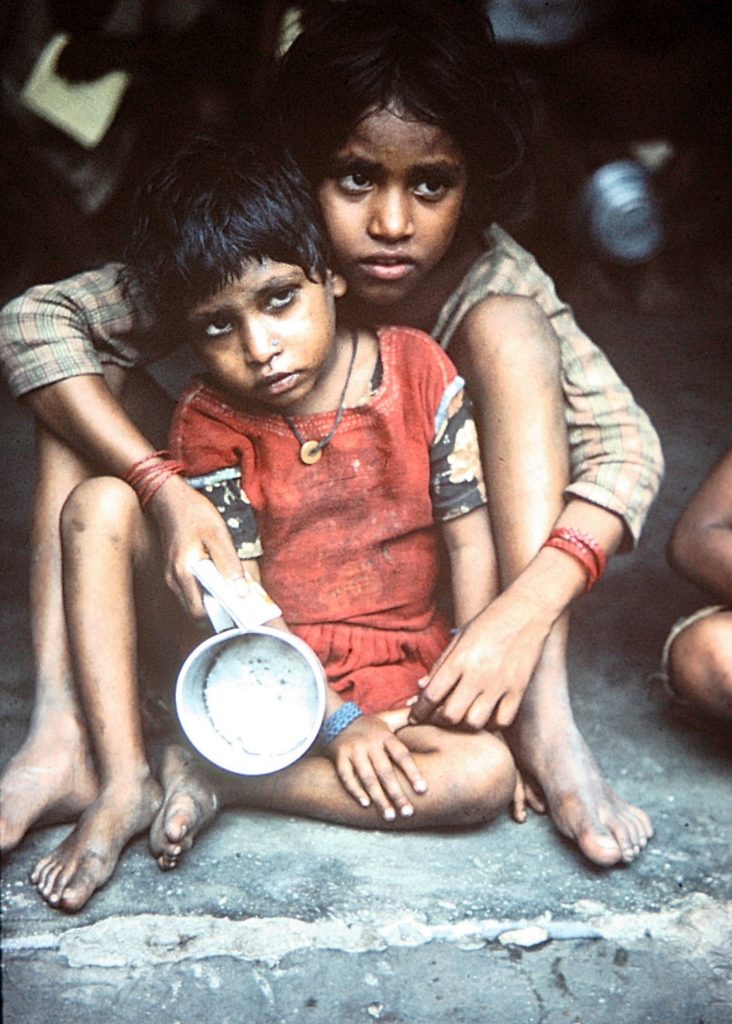“I did not Protect my Daughter”
I found this document in my 1973 files. It reflects a time in my career when I could still cry when I entered a refugee camp. Over time you learn to protect yourself from an excess of emotion and write in the more clinical and detached manner of my recent writings.
There are 600,000 of them, more or less, living in the dreadful conglomerations called “Bihari Camps”. They are united by the URDU language and their Indian origins, and condemned by the hatred of their countrymen to huddle in wretched camps. TB, Smallpox, skin diseases and every other known affliction is rampant, encouraged by a 300 daily calorie diet – 20% of the recognized human minimum. I visited one such camp early on a Monday morning to deliver vegetable seeds to a cluster of 18,000 people living in a few acres of the Adamjee Jute Mills. I was greeted by the sordid situation described below.
- Grandmothers try to keep the kids alive.
- These are only weeds from the side of the road. But that’s all we have.
ADRIFT
The circle of sullen faces waited patiently, ever the omnipresent tea. Drifting splinters of humanity with bitter memories of architecture, engineering, medicine and ivy halls.
“How many were there?”
“Twenty or so”
“You have strong men… why didn’t you stop them?”
“There would have been bloodshed.”
The strapping young Swiss inquisitor had no reply for the stooped shoulders of men who had chosen between their lives and the chastity of their daughters. Leaving the ransacked office we picked our way through the human flotsam which huddled in a forgotten corner of the world’s largest jute mill.
“But was there no provocation?”
“None”
“It’s been quiet for months….why did they come?”
“There was a girl….”
A few acres for 18,000 human rejects. Hungry people take little space…unless the bellies are bloated with malnutrition. Every empty plot and the dry bottom of ponds sprouted vegetable green with seeds we had supplied last visit.
“….she refused to marry a Bengali and has run away.”
“But why do they bother others”
“They accuse the camp of collaborating to get her away, now they say they will take twenty girls.”
“How many were raped last night?”
“We aren’t sure, but several were also kidnapped.”
The former Swiss journalist waded through the horde of children, encouraging their touch and laughter. The bamboo hut with neat wooden benches was not teaching Bengali this morning; nobody had slept that night.
“Have you reported this incident to the authorities?”
“We are afraid to go outside the gate – and what good would it do?”
“Who were these men?”
“They have full political support and nobody will stop them.”
The Red Cross jeep headed for the police station in a cloud of red dust. I avoided the slumped body on a thin mat in the dark hallway and stepped into the hospital. The medicine shelf insufficient for a suburban day camp, several mats on the floor, no explanation was required.
“When will you leave this place?”
“If the government grants us amnesty….”
“Have you requested it?”
“We will beg forgiveness….but whom do we ask?”
The hoarse whispers were barely audible above the clatter of the nearby looms which once had been their livelihood…the dying cries of a human shipwreck when shore becomes obscured in the mist of indifference.
“If this country will not accept you where will you go?”
“There is no other place.”
Note: I visited the inappropriately named “Geneva Camp” in Dhaka, Bangladesh in January 2018. This is now simply an urban slum where the remnants of these populations exist in sullen denial or slowly seep into the dominant culture which has stopped caring if they integrate or not.







